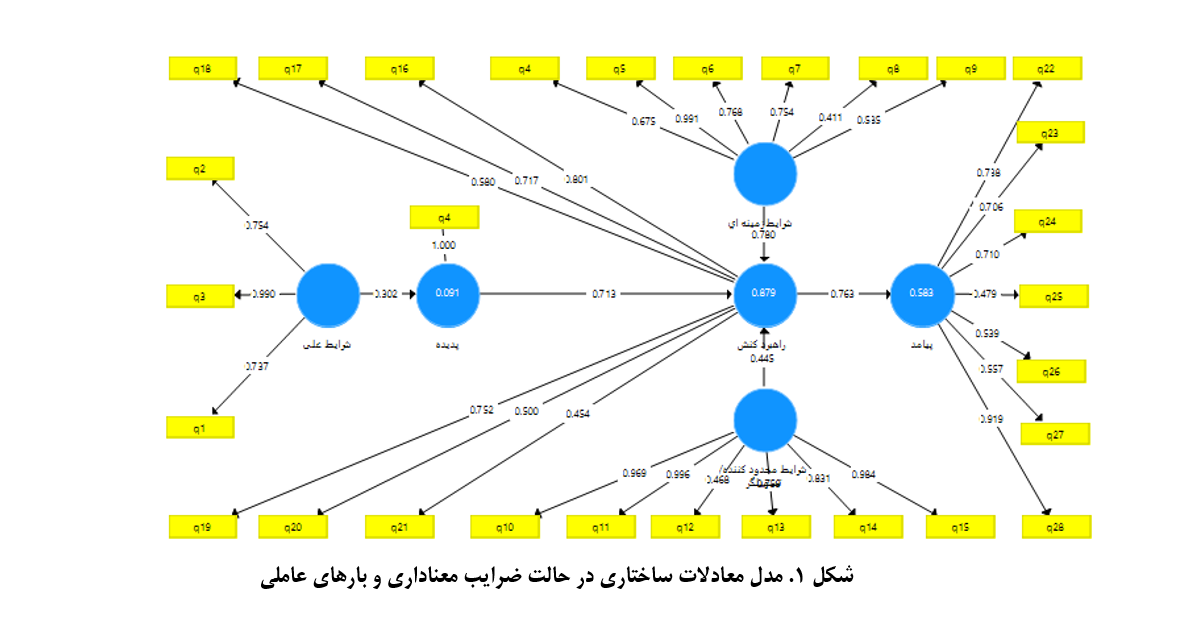اعتبارسنجی شاخصها و مؤلفههای فرهنگ سازمانی در مدارس عراق
کلمات کلیدی:
فرهنگ سازمانی, مدارس عراق, تعلیم و تربیت, اعتبارسنجیچکیده
هدف از پژوهش حاضر اعتبارسنجی شاخصها و مؤلفههای فرهنگ سازمانی در مدارس عراق بود. این پژوهش بهمنظور پر کردن خلاء موجود در مطالعات قبلی که بیشتر بر سازمانهای صنعتی و خدماتی تمرکز داشته و کمتر به مدارس و نهادهای آموزشی توجه کردهاند، طراحی و اجرا شده است. روش پژوهش حاضر کمی (توصیفی-پیمایشی) و از نظر هدف، کاربردی است. جامعه آماری پژوهش شامل تمامی معلمان و کارکنان آموزشی مدارس شهرستان واسط عراق میباشد. حجم نمونه با استفاده از جدول مورگان 310 نفر انتخاب شدهاند. روش نمونهگیری نیز تصادفی ساده بوده است. ابزار جمعآوری دادهها، پرسشنامهای محققساخته بر اساس مصاحبههای نیمه ساختاریافته است که روایی آن با دیدگاه اساتید و پایایی نیز با آزمون الفای کرونباخ بررسی شده است. همچنین برای تجزیه و تحلیل دادهها از رویکرد معادلات ساختاری با نرم افزار PLS Smart استفاده شد. نتایج نشان داد شرایط علی با بار عاملی (32/2) و مقدار t (87/4)، شرایط زمینهای با بار عاملی (760/) و مقدار t (25/5)، شرایط مداخلهگر با بار عاملی (667/) و مقدار t (97/4)، راهبردها با بار عاملی (445/) و مقدار t (95/4) و پیامدها با بار عاملی (32/2) و مقدار t (36/4) معنادار بودند. میتوان نتیجه گرفت الگوی ارائه شده فرهنگ سازمانی در مدارس کشور عراق دارای اعتبار هست لذا برنامه ریزان و متولیان اموزش و پرورش میتوانند از نتایج این پزوهش در توسعه فرهنگ سازمانی استفاده کنند.
دانلودها
مراجع
Hofstede GH. Culture's Consequences: Comparing Values, Behaviors, Institutions, and Organizations Across Nations:
Sage Publications; 2001.
Hofstede GJ, Hofstede GJ, Minkov M. Cultures and Organizations: Software of the Mind. London: McGraw-Hill;
262 p.
Lothans C. Education, Cultures, and Societies. Yemeeni Doozi Sarhabi M, editor. Tehran: Shahid Beheshti University
Press; 2010.
Assoratgoon W, Kantabutra S. Toward a sustainability organizational culture model. Journal of Cleaner Production.
;400. doi: 10.1016/j.jclepro.2023.136666.
Pavlidou CT, Efstathiades A. The Effects of Internal Marketing Strategies on the Organizational Culture of Secondary
Public Schools. Evaluation and Program Planning. 2021;84. doi: 10.1016/j.evalprogplan.2020.101894.
Pedraza-Rodríguez JA, Ruiz-Vélez A, Sánchez-Rodríguez MI, Fernández-Esquinas M. Management Skills and
Organizational Culture as Sources of Innovation for Firms in Peripheral Regions. Technological Forecasting and Social
Change. 2023;191. doi: 10.1016/j.techfore.2023.122518.
Parsakia K, Namjoo K, Arjmand M, Sabzvand A, Rahyan H, Fazli A, et al. The mediating role of work engagement
in the relationship between psychological climate and productivity and job satisfaction in teachers. International Journal of
Innovation Management and Organizational Behavior (IJIMOB). 2022;2(2):8-23.
AlSaied MK, Alkhoraif AA. The role of organizational learning and innovative organizational culture for
ambidextrous innovation. The Learning Organization. 2024;31(2):205-26. doi: 10.1108/TLO-06-2023-0101.
Chalmers R, Brannan GD. Organizational Culture: StatPearls Publishing; 2024.
Jain MS. Workplace Ostracism, Organizational Culture, and Work-Life Balance Among Academicians – Navigating
EdTech Realms. Eatp. 2024:7551-61. doi: 10.53555/kuey.v30i5.4209.
Winata LRW. The Influence of Organizational Culture, Situational Leadership and Emotional Intelligence on
Organizational Commitment Through Job Satisfaction at PDAM Tirta Ardhia Rinjani, Central Lombok Regency. Journal of
Economics Finance and Management Studies. 2024;07(05). doi: 10.47191/jefms/v7-i5-17.
Kavala HB, Devi PG, Mandal S. Does Organizational Culture Matter for Shaping Up Hotel's Agility? An Empirical
Investigation. Global Health & Medical Tourism (GloHMT). 2019.
Zarei Matin H. Fundamentals of Organization and Management: A Contingency Approach. Tehran: University of
Tehran Press; 2018.
Goudarzi A, Gominian V. Principles, Basics, and Theories of Organizational Atmosphere. Isfahan: Jihad Daneshgahi
Publications; 2003.
Gorzelany J, Gorzelany-Dziadkowiec M, Luty L, Firlej K, Gaisch M, Dudziak O, et al. Finding links between
organisation's culture and innovation. PLOS One. 2021;16(10). doi: 10.1371/journal.pone.0257962.
Mikusova M, Klabusayova N, Meier V. Evaluation of Organisational Culture Dimensions and Their Change Due to
the Pandemic. Evaluation and Program Planning. 2023;97:1-13. doi: 10.1016/j.evalprogplan.2023.102246.
Deal TE, Kennedy AA. Corporate Cultures: The Rites and Rituals of Corporate Life. Harmondsworth: Perseus Books;
Schein E. Organizational Culture. Mahjoob ME, editor. Tehran: Fra Publications; 2010.
Flamholtz EG, Randle Y. Corporate Culture: The Ultimate Strategic Asset. Stanford, California: Stanford Business
Books; 2011.
Robbins SP. Organizational Theory: Structure and Organizational Design. Tehran: Ashraghi & Safar; 2011.
Aban Eh, Khodashenas MR, editors. The Role of Education in Scientific, Cultural, and Social Development. Second
National Conference on Challenges and Solutions for Development, Kahnooj; 2015.
Panahi. Cultural Development: A Necessity for Economic, Social, and Political Growth. Welfare and Social
Development Planning. 2015;7(22):1-23.
Nissani MR, Rameshgar R. The Role of University Cultural Activities in the Cultural Development of Society.
Cultural Engineering Journal. 2015;8(76):111-31.
Manafi Sharaf Abadi K, Zamani E. The Role of the Education System in the Cultural Development of Society. Cultural
Engineering Journal. 2012;7(73):135-51.
Babaei Fard A. Cultural and Social Development in Iran. Social Welfare Journal. 2019;10(37):7-56.
Akpa VO, Asikhia OU, Nneji NE. Organizational culture and organizational performance: A review of literature.
International Journal of Advances in Engineering and Management. 2021;3(1):361-72.
Zheng W. The Impact of Organizational Culture, Structure, and Strategy on Knowledge Management Effectiveness
and Organizational Effectiveness: University of Minnesota; 2005.

دانلود
چاپ شده
ارسال
بازنگری
پذیرش
شماره
نوع مقاله
مجوز
حق نشر 2025 نشریه پژوهش و نوآوری در تربیت و توسعه

این پروژه تحت مجوز بین المللی Creative Commons Attribution-NonCommercial 4.0 می باشد.










